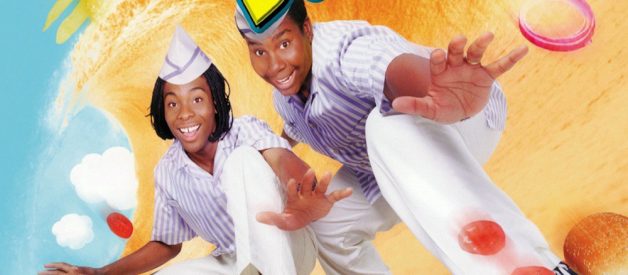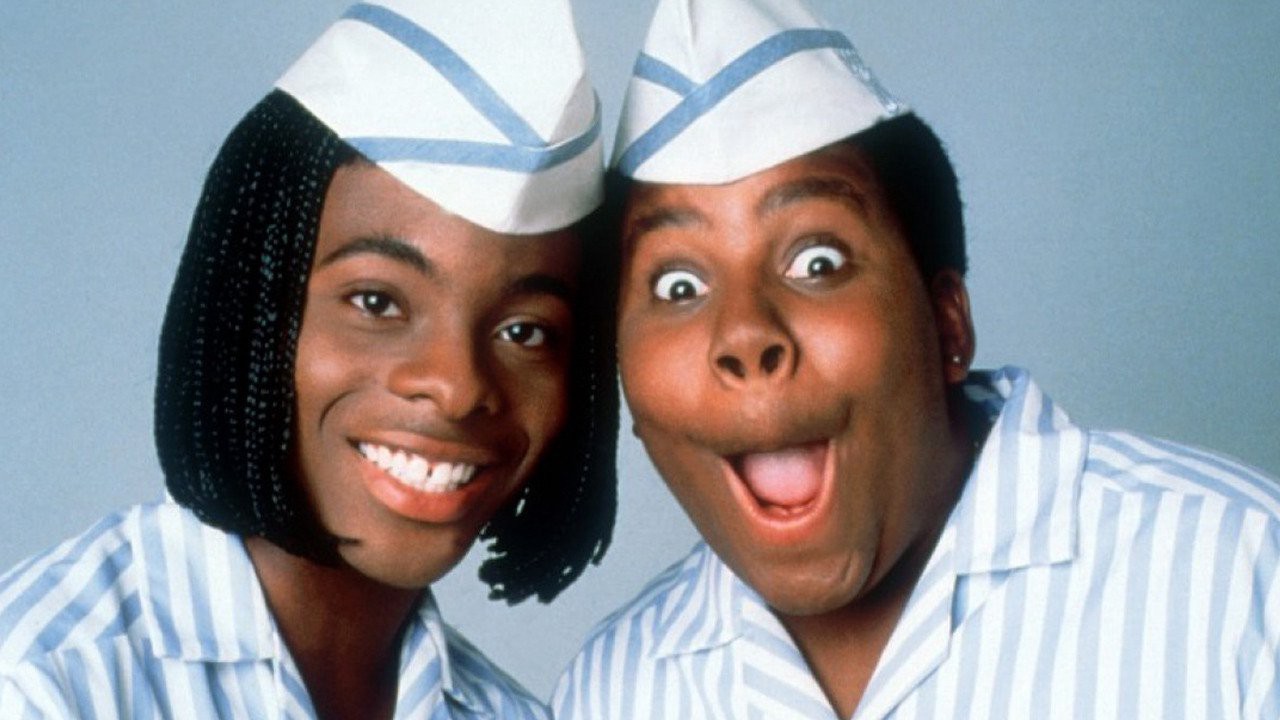 Kel Mitchell (left) and Kenan Thompson (right)
Kel Mitchell (left) and Kenan Thompson (right)
?Welcome to Good Burger, home of the Good Burger, can I take your order??
Good Burger might not be a veritable classic in the eyes of film critics, or even in the scope of cinema itself, but ask any ?90s kid about the good old days of Nickelodeon during that time and they?ll probably tell you how fantastic their television programs were back then, and how more contemporary productions pale in comparison. One fond memory for many from the ?90s is of Nickelodeon?s variety show, ?All That?, which was a tour de force during the time that offered a well-written, humorous, and family-friendly presentation filled with talented young actors; Nickelodeon and shows such as All That are responsible for launching the careers of many child actors, some of them more successful than others. In hindsight, All That may have been ahead of its time.
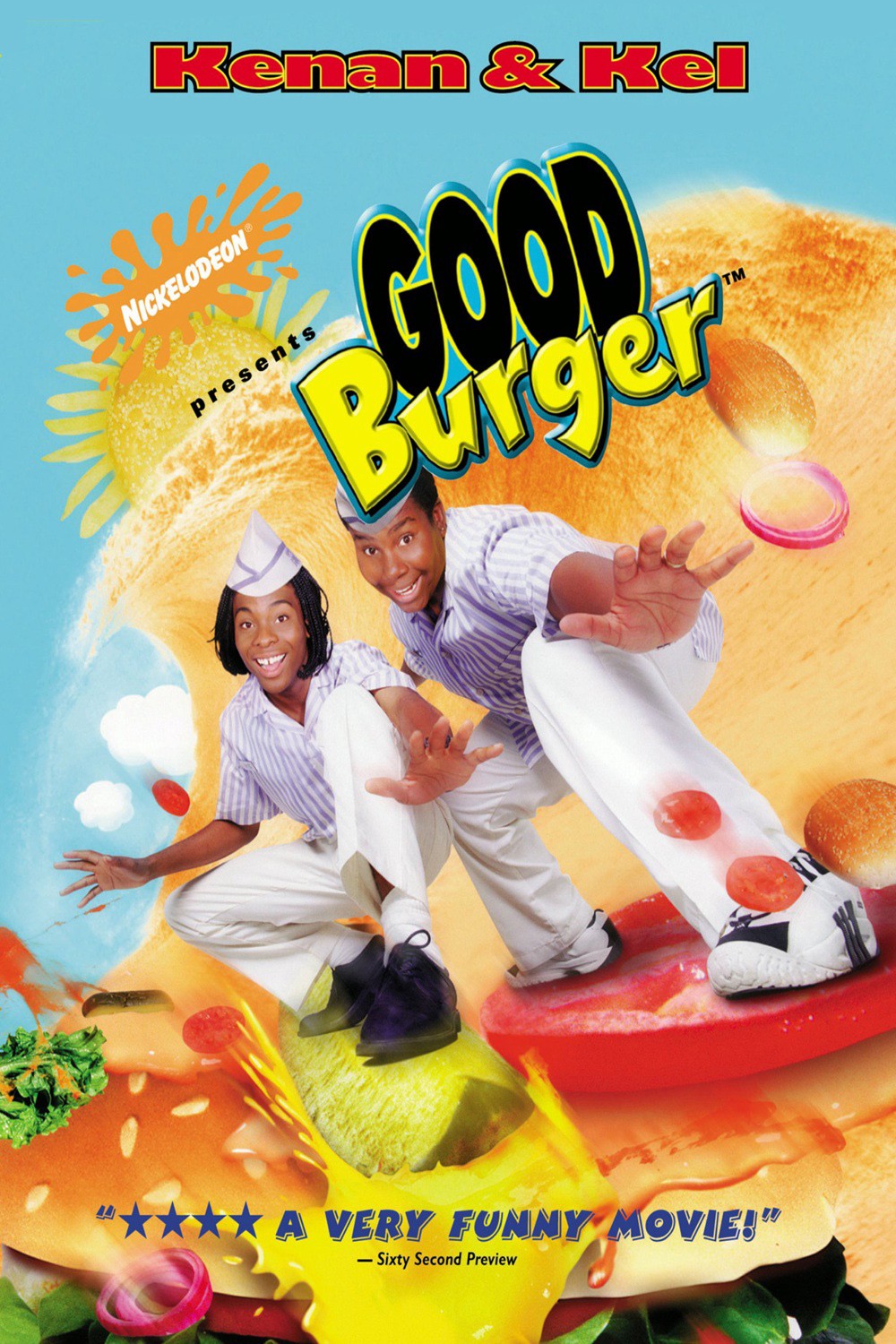
One popular sketch from All That was turned into a full feature film: Good Burger. The sketch featured actor Kel Mitchell, one of the show?s best, playing a good-natured but dopey cashier at the titular fast food joint. The feature film adaptation of the sketch was released on July 25th of 1997 to middling reviews, but fortunately history has not forgotten the movie, as the ?official HD version? is available exclusively on Netflix. Joining Kel Mitchell is Kenan Thompson, who you might recognize from the current seasons of Saturday Night Live (no surprise there, he?s been doing variety shows for a while).
Despite the less-than-exemplary reviews it received upon its release, Good Burger has a lot going for it. It?s more relevant to modern audiences than it was twenty years ago, actually. I propose that Good Burger is more than just a lighthearted comedy, it?s secretly a bittersweet parable about the American workforce.
Let?s break it down, shall we?
First of all, the two main stars are both African-American, which should be a plus to those who are passionate about equal representation in entertainment. Compare that to modern day, when opposing views on social media dictate that a show like Marvel?s ?Luke Cage? is special because the cast is mainly black. To top it off, neither of the characters are racist stereotypes either, which is something that recent major blockbusters such as the Ghostbusters reboot have been widely criticized for. Wait, what?s the score so far?
Good Burger: 2
Modern movies: 0
The plot of Good Burger revolves ? or at least starts with ? around Thompson?s character, Dexter, a typically ne?er-do-well teenager with no respect for authority. On the very first day of summer, Dexter, much to the chagrin of his teacher Mr. Wheat, is so totally happy to be done with school that he decides to take his mother?s car for a little secret joyride while she?s away on business. He plans to do absolutely nothing over the summer but relax and pig out on Chinese food, which makes his friend riding home with him very jealous.
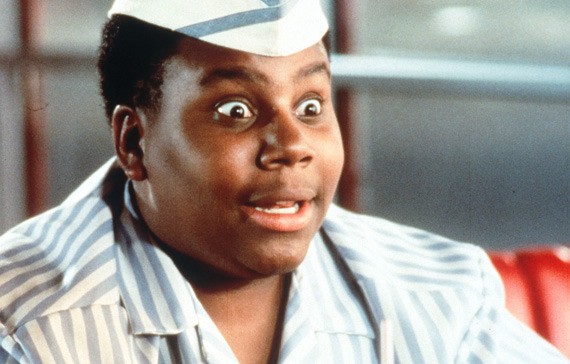
His hubris is his downfall. Unfortunately, and somewhat ironically, he crashes into Mr. Wheat?s car on the road when the dutiful Ed, on his way to work, causes him to spin out of control. He faces the threat of jail time because he?s neither insured or in possession of a driver?s license. Instead of getting him in serious trouble though, Mr. Wheat gives him a second chance, and forces him to get a summer job to pay for the repairs. Mr. Wheat is an interesting character too, not because of the character?s actions or lines, but because of his appearance. Early on in the movie, when Dexter is at school, you can clearly see that Mr. Wheat, played by Sinbad, is dressed like a relic from the disco era, sporting an afro and looking a little bit like Austin Powers. Scrawled in clearly visible letters on his jacket is, ?I?m black and I?m proud?, among other quotes. Dexter makes sure to ridicule Mr. Wheat on his way out of the classroom when he leaves too. There?s no established reason why Mr. Wheat should be such a loony character, plot-wise or visually. Perhaps it?s a subtle metaphor, and Good Burger means to imply that Mr. Wheat is ancient, a caricature trapped in the past. It would seem to say, in light of the movie?s target audience, that we should leave any silly and negative aspects of the past behind, along with racism and outdated perspectives. Instead, we should take the good things from the past along with us to help forge ahead with new ideas. It?s a play on the ?rebellious teen? story trope, where the young people are ignorant and unwilling to heed the advice of their elders, and here Mr. Wheat (the elder) is painted as the ignorant one.
Spurred by responsibility and frustration that his summer vacation has been stymied, Dexter eventually winds up working at Good Burger, where humble and dopey Ed, whom Dexter does not recognize as the initial cause of his problems yet, greets every customer with a smile. His peers and his employer (played by Dan Schneider) know Ed is a little different, but they accept him for who he is. Over time, Dexter begins to appreciate Ed more and more, realizing that Ed is more than he appears to be on the outside. It?s worth noting that Kel Mitchell sells his character so well that you might find yourself wondering why he?s not a more prominent star nowadays. His line delivery, facial expressions, and comedic timing are pitch perfect. Any scene with Ed is a delight.
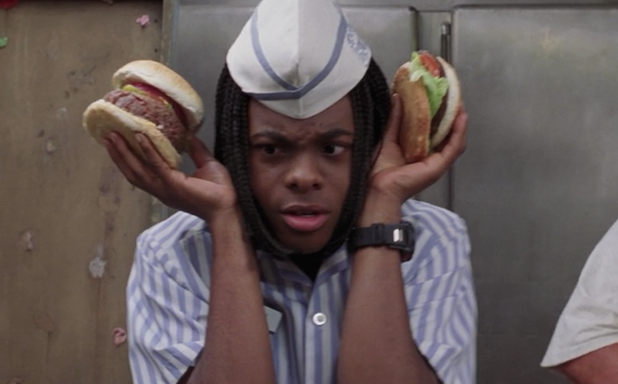
It may sound like a simple setup, but the plot of Good Burger is a positive message for young people because it teaches a lesson as old as time: there?s no substitute for hard work. Dexter might technically be working against his will, but that?s not exactly an unheard of occurrence, many teenagers in the workforce seem like they really don?t want to be there when you meet them at the counter to place your order. The value of work and the almighty dollar is important to instill in young people because it prepares them for the real working world of grown-ups. ?Why does this matter so much?, you ask? The United States is struggling with unemployment and many other workforce related issues, not to mention the younger generation is frequently (always?) derided for not appreciating the right to work and being lazy. A movie about teenagers taking responsibility for their actions, working, and making money, can only be a good thing. There?s also the matter of college tuition and student loan debt, a huge problem for the vast majority of students that forces them to work off their debt somehow. Dexter?s problem with the car repairs, while smaller in scale, is similar to this because he too is forced to pay off a debt, with someone older and possibly not all that wiser looming angrily over his shoulder.
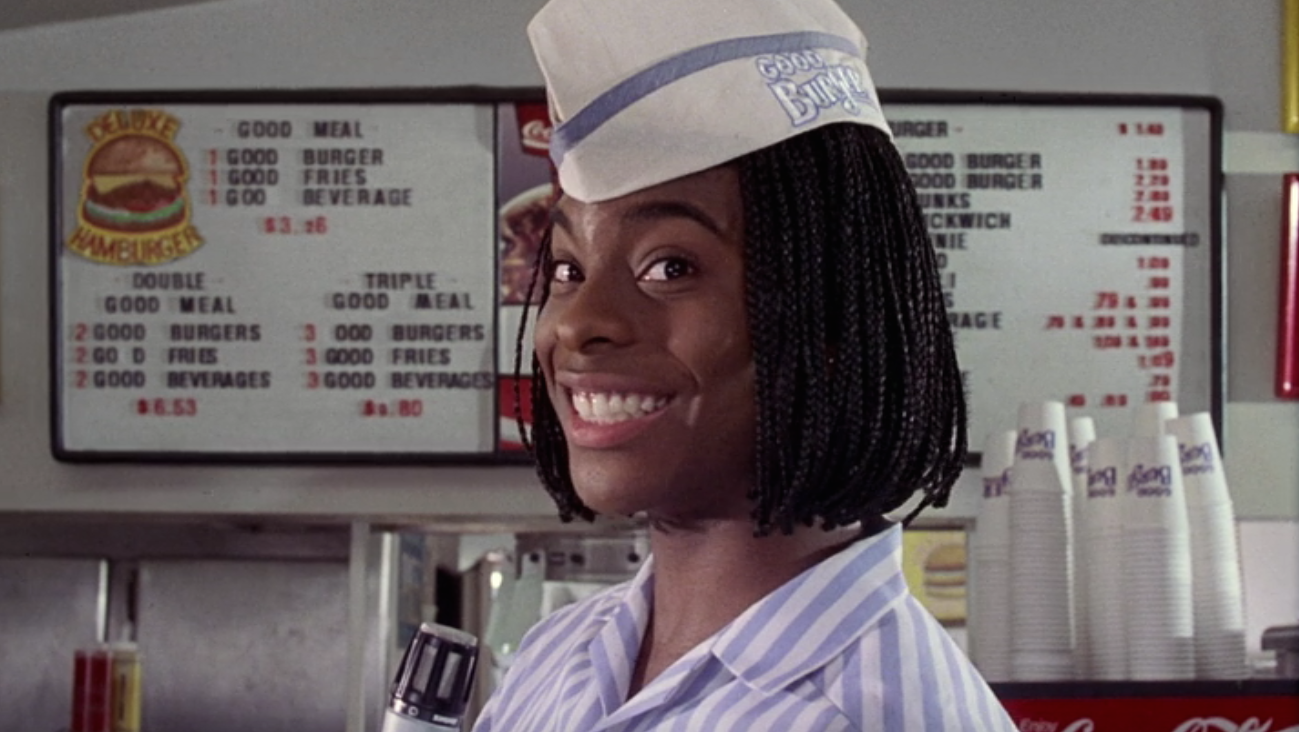
Where the movie really excels is the central conflict, which is created by the competition between Good Burger, a local Mom and Pop kind of place that you only see in the town it?s built in, and the overly fancy Mondo Burger which opens across the street, whose angry and violent owner has aspirations of global domination. Mondo Burger is an analog of every major fast food franchise in the world, and then some. Their portions are comically large, the atmosphere is flashy and absurd, all the employees are drone-like and samey, the ingredients in the food are shady to say the least, and the boss is the world?s biggest jerk. Sound like anyone or any place you know? Without spoiling too much of the moment-to-moment plot, Good Burger is not only an entertaining family movie, but also a movie that slyly manages to be a commentary on the fast food industry and big business. Here is where Good Burger teaches us two more lessons: there?s no substitute for good old fashioned home cooking, and always support your local businesses; the employees at Good Burger cook all their food by hand, the hard way. Coincidentally, one of Good Burger?s employees happens to be an elderly gentleman who, according to the characters, has been working in the fast food industry nearly his whole life.
The middle part of the story involves an invention by Ed that makes Good Burger a lot of money, which also happens to be a clever reference to capitalism and famous inventions throughout history. Ed comes up with a wonderful creation, but Dexter is the one that suggests selling it to customers. He then promptly dupes Ed into giving up most of the royalties for his creation, to which Ed agrees to because he?s such an honest friend. Ed is left nearly penniless in the process, and Dexter greedily takes the larger portion of the money. It might be the movie?s most obvious allegory, with Ed being the lowly unsung inventor, and Dexter clearly being the marketing industry and/or the ?big business? that takes all the credit (and he?s in debt, nonetheless).
Another part of what makes Good Burger such a good film is the genuine nature of its technical aspects. Practical effects are used whenever possible. Burgers and patties float in the air by string, live sets are used instead of green screens, the characters interact with props, and the visual aesthetic of the film itself just looks nice. The movie is flatly shot at times, refrains from techniques such as ?shaky cam?, and gives each person on screen plenty of room to make an impression within each frame and angle. Each set is designed with loads of painstaking detail, even going as far as making actual Good Burger employee uniforms and beyond. Real food, obviously real food, is used on screen by the actors. The writing is confident and droll, and the dialogue never sounds forced or contrived. It also has one of the best original songs on a soundtrack ever, ?We?re All Dudes?. How many modern movies use CGI for the most ridiculous things possible? Practical effects are almost a lost art, and when they?re done well, they?re more magical than computer generated graphics.
?We?re All Dudes? by Less Than Jake featuring Kel MitchellThis is the official music video for the song, but it?s not great quality.
Even the movie?s original song is amusing and witty in its own right. Ed says the lyrics in the movie, singing to himself, but it?s unclear exactly why. Is Good Burger subtly encouraging a shift in mindset considering gender identity? It?s a bit of a stretch, but you can?t deny that the lyrics say what they say. Are the lyrics of the song meant to just be the crazy ramblings of Ed, or are they trying to say something more? To take the lyrics a little too seriously, one could say that ?We?re All Dudes? is a message to the viewer, children notwithstanding, that at the end of the day we are all in this together and no separation of race, gender, or social class should keep us from being friends. By contrast, Mondo Burger is actively elitist and literally discourages fun and outside-the-box thinking. Just look at some of the lines from the lyrics:
There?s nothing better than your friendsthere?s no problem you can?t winsomeone who?s always got your backnot giving about this and that
It?s no secret that the internet is a haven for hatefulness and separation, and the attitudes of negativity propagated by it continuously find their way into the real world. Given today?s social climate, the best thing we can do for today?s young people is invite a spirit of neighborliness into their lives. Good Burger might be a movie about hamburgers and money, but it?s also a movie about doing the right thing and doing right by your friends. Dexter and Ed bond in the movie on personal issues, and Ed at one point even innocently misunderstands Dexter in conversation and asks him if he wants to break a certain agreement because he?s black. Ed isn?t concerned about skin color, or any differences between people really, all he sees is other people and it?s evidenced in the song lyrics he sings to himself. Ed might as well be Justice, and Justice is blind, doling out karma and vengeance to anyone who deserves it with no discrimination: a force of nature.
Good Burger is filled with jokes disguised as insight. We may never know if it was done on purpose, but going on the fact that the movie is based on a sketch from All That, we can make an educated guess and say it probably wasn?t on accident. Without giving away any spoilers, the movie then leaves us on a happy but open-ended note, no grandiose happily ever after but instead a ?well, life goes on?. Sure the story has a fun and satisfying climax, but the real end of the movie basically tells us that the characters returned to their normal lives. It?s a curious decision, creatively speaking. Is the journey of Ed and Dexter more important than the ending? The movie begins because Dexter is forced to work a summer job, then shows us an unlikely friendship between an ungrateful teenager and an enigmatic dimwit, evolves into a conflict between an underdog and a tyrant, then ends with a simple smile.
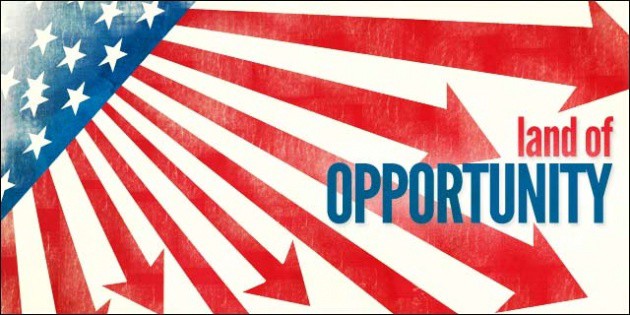
Our heroes profit by virtue, in addition to a small amount of cash from Ed?s invention, but they?re basically in the same place they began when all is said and done. The viewer is left to draw their own conclusions about everyone involved: the restaurant, Dexter who is still in school, Ed who loves his job to death, and the other employees who were caught up in the events. Neither of the main characters meet all the requirements for a type of literary hero. Good Burger is a mysterious story that leaves us on a positive note, but there?s some interpretation as exactly what its positive note really is. One could argue that it has no message, it?s all just for laughs, but that would be too simple, wouldn?t it?
In a certain light, Good Burger, a restaurant run by real people with real goals and real problems, could even be seen as a reflection of the American dream, something that many are questioning the real meaning of in the middle of all the bickering between ?conservatives? and ?liberals?, and the constant supercharged controversies in the media. Google defines the American dream as:
The ideal that every US citizen should have an equal opportunity to achieve success and prosperity through hard work, determination, and initiative.
Are we overanalyzing Good Burger? I don?t think so. In a world where people are constantly at each other?s throats over one controversial issue or another, maybe all we need is a good burger and a friendly face from a real person, not a faceless corporation. After all, some of America?s most classic callbacks to the past is of the diner, of all things, a place where people could go to have burgers, shakes, soda, and just hang out with their friends. Good Burger is a better restaurant that is hilariously low tech compared to its rival, and I think that?s a good analogy for younger viewers who are steeped in today?s ultra high resolution cutting edge world. Both Ed and Dexter are people who work for their own reasons, each of them achieving success by different means. Ed works because he loves to work, for example, and continues to work after the movie?s end. That?s all he is, a young person whose only aspirations are to be a good worker and help his friends, but his ?success? is measured by one?s interpretation of the American dream. Is Ed?s persistence as a friend and employee an example for young people to aspire to, or is Dexter?s journey from being an irresponsible teenager to becoming a better person more relatable? I think the answer is both, as both characters are different sides of the same coin, two examples that which younger viewers can use to compare to their own walks of life. To put it in a nutshell, regardless of what may come our way, making boastful claims and trying to cut us out with malice, we can always rely on hard work, ingenuity, and goodwill to keep us afloat. That, and good food. The way I see it, an uplifting story about summer jobs, cheeseburgers, and responsibility, is the one of the most relevant stories that any generation could appreciate. For that reason, I say that Good Burger is more relevant than it was when it was released, today?s young people need examples of hard working everyday heroes that make the world go ?round, even if the end result is merely peace and longevity instead of a Hollywood fabrication.

